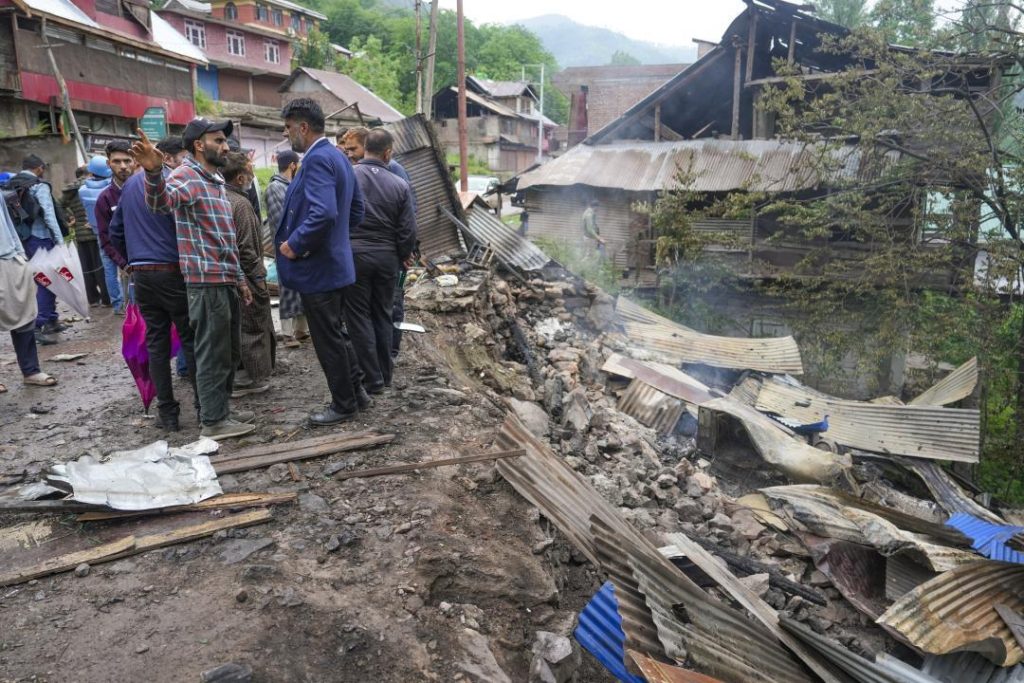
Sat to eat when sirens went off due to Pak shelling: J&K resident
The Uri town in Jammu and Kashmir’s Baramulla district experienced a harrowing night on Thursday, as Pakistan unleashed a barrage of shelling that left one woman dead and several others injured. The incident has left the residents of Uri shaken, and 38-year-old Babar’s tale is a testament to the trauma and fear that they face on a daily basis.
“We just sat down to eat when the siren rang out,” Babar recalled, his voice still trembling with fear. “We left everything and ran to the neighbours’ bunker.” The siren had sounded, warning the residents of an impending attack, and Babar’s family had barely begun their evening meal when the shelling began.
The incident is a stark reminder of the fragile state of relations between India and Pakistan, which have been locked in a bitter standoff for decades. The Uri town, which is located about 100 km north of Srinagar, has been a frequent target of Pakistani shelling, with the Pakistan Army frequently violating the ceasefire agreement along the Line of Control (LoC).
Babar’s family had barely recovered from the trauma of previous attacks. His house had been destroyed twice in the past, once during the 1999 Kargil War and again during the 2005 Kashmir earthquake. The memory of those traumatic events still haunts him, and the latest attack has left him feeling helpless and scared.
“I have lost count of the number of times we have been forced to evacuate our homes and take shelter in bunkers,” Babar said, his eyes welling up with tears. “We have seen so much destruction, so much bloodshed. It’s like we are living in a perpetual state of war.”
The Uri town is a small, quiet place, with a population of around 10,000 people. The residents are primarily farmers and shopkeepers, who eke out a living from the fertile soil and the bustling markets. However, the constant threat of Pakistani shelling has made life difficult for them, with many families forced to live in fear of their lives.
The latest attack began on Thursday night, around 9 pm, when Pakistani troops started shelling the Uri town with mortars and rockets. The residents were caught off guard, with many families still out in the open, enjoying the evening air. The siren went off, warning of the impending attack, but many people were too stunned to react quickly.
“It was like a scene from a war movie,” said 25-year-old Gulzar, who was among the first responders to the scene. “People were running everywhere, screaming and crying. The sound of the shelling was deafening, and it seemed like there was no end to it.”
The shelling continued for hours, with the Pakistani troops targeting multiple areas of the town. The Indian Army responded quickly, firing back at the Pakistani positions and trying to neutralize the threat. However, the damage had already been done, with one woman killed and several others injured in the crossfire.
As the night wore on, the residents of Uri began to emerge from their bunkers, surveying the damage and trying to make sense of the chaos. The town was left littered with debris, with many buildings reduced to rubble. The streets were strewn with broken glass and shattered windows, and the air was thick with the smell of smoke and fear.
The Uri town is a symbol of the fragility of life in Jammu and Kashmir, where the constant threat of violence and terrorism hangs over the residents like a specter. The latest attack is a stark reminder of the need for the Indian government to take action to protect its citizens, and to ensure that the peace and tranquility of the region are maintained.
As Babar’s family begins to rebuild their shattered lives, they are left wondering when the next attack will come. They are forced to live in a state of constant fear, never knowing when the siren will go off again, and when they will have to flee for their lives.
“We just want to live in peace,” Babar said, his voice cracking with emotion. “We want to be able to go to bed at night, without the fear of being killed or injured. We want to be able to live our lives, without the constant threat of violence hanging over us.”






